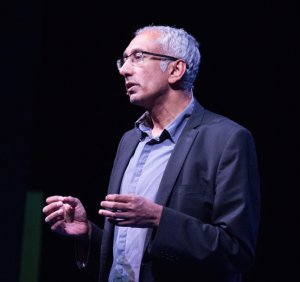Presented By: Center for European Studies
CES/ISP Lecture. The Making of European Jihadis
Kenan Malik, writer, lecturer, and broadcaster

More than 4000 people from Europe have gone to Syria to fight with IS. They include mothers, grandfathers, school students, doctors, and teachers. What is it that draws thousands of Europeans to a brutal, sadistic organization like IS? The conventional answer is “radicalization”: a process through which extremist groups or “hate preachers” groom vulnerable Muslims for jihadism by indoctrinating them with extremist ideas. Some commentators blame Western authorities for pushing young Muslims into the arms of the groomers. Others stress the “pull” factor, insisting that the problem lies with Islam itself, a faith that, in their eyes, legitimizes violence, terror, and inhumanity.
The speaker will argue that neither claim is credible and that the problem with much of contemporary discussion about terrorism lies in the very idea of “radicalization.” Through exploration of the life stories of European jihadis, he will challenge conventional ways of thinking about “radicalization,” “alienation,” and “integration.”
Kenan Malik is a London-based writer, lecturer, and broadcaster. His latest book,From Fatwa to Jihad: The Rushdie Affair and its Legacy (Atlantic, 2009) explores the issues that the Rushide affair raised, in particular the questions of muliculturalism, radical Islam, and free speech, and shows how in responding to these issues Western liberals have betrayed the fundamental beliefs of liberalism. It was shortlisted for the 2010 Orwell Book Prize. His current project is a history of moral thought.
Part of the European Mosque series, jointly sponsored by the Center for European Studies and Islamic Studies Program, which focuses on the mosque and its place in the European landscape. What cultural and social role does the mosque play for Muslims in Europe? How do European mosques blend traditional Islamic and modern European architectural features, and traditional preaching with modern technology? What is unique about the European mosque, and how does it shape the lives of European Muslims?
The speaker will argue that neither claim is credible and that the problem with much of contemporary discussion about terrorism lies in the very idea of “radicalization.” Through exploration of the life stories of European jihadis, he will challenge conventional ways of thinking about “radicalization,” “alienation,” and “integration.”
Kenan Malik is a London-based writer, lecturer, and broadcaster. His latest book,From Fatwa to Jihad: The Rushdie Affair and its Legacy (Atlantic, 2009) explores the issues that the Rushide affair raised, in particular the questions of muliculturalism, radical Islam, and free speech, and shows how in responding to these issues Western liberals have betrayed the fundamental beliefs of liberalism. It was shortlisted for the 2010 Orwell Book Prize. His current project is a history of moral thought.
Part of the European Mosque series, jointly sponsored by the Center for European Studies and Islamic Studies Program, which focuses on the mosque and its place in the European landscape. What cultural and social role does the mosque play for Muslims in Europe? How do European mosques blend traditional Islamic and modern European architectural features, and traditional preaching with modern technology? What is unique about the European mosque, and how does it shape the lives of European Muslims?